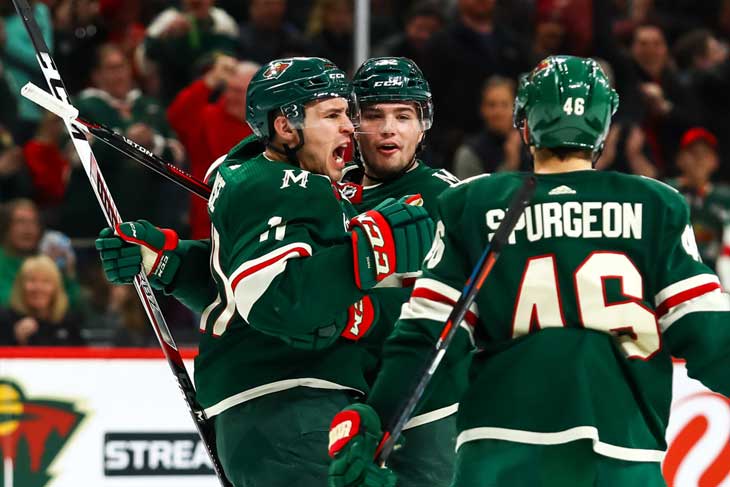2018-19 Season Review: Minnesota Wild
In Bruce Boudreau’s first two seasons at the helm of the Minnesota Wild, the franchise produced its two best offensive years ever. That probably didn’t come as any surprise considering his track record in Washington. While the Wild weren’t title contenders, they were still well on their way to another solid campaign in 2018-19.
The team had posted a 17-13-2 record (16th) by mid-December and was averaging 3.16 goals scored per game. The coaching staff had managed to combine the stinginess of years past with the bench boss’ knack for generating offense, which resulted in stellar underlying numbers: Minnesota controlled 50.0% of the shot attempts (17th), 53.8% of the scoring chances (6th) and 57.0% of the high-danger opportunities (3rd) for an expected goal share of 54.0% (5th) at 5-on-5. Its actual GF% (50.8) lagged a bit behind because it lacked pure finish, but the Wild were performing like a playoff club.
Mikael Granlund, Zach Parise and Eric Staal were leading the charge up front. Even Mikko Koivu, whose offense had steadily declined with age, was off to a wonderful start with 21 points in 27 games. Matt Dumba was providing a spark from the back end, whereas fellow blueliners Ryan Suter and Jared Spurgeon were delivering their usual blend of two-way effectiveness. Jonas Brodin remained stout in his zone as well. Devan Dubnyk wasn’t standing on his head, but his play between the pipes was acceptable.
All in all, the Wild were in good shape. Then an injury derailed their season.
Dumba suffered a ruptured pectoral muscle that sidelined him for the final 50 games of the year. Since Minnesota selected him seventh overall in 2012, the 25-year-old has slowly but surely developed into a big-time contributor. His mobility and booming shot are tough to defend, and he also brings a measure of nastiness to a team that seldom displays much attitude. In short, the Wild could count on him to light a fuse whenever necessary. At the time of his injury, he ranked first among defensemen in goals and power play goals, fourth in scoring chances and second in high-danger chances while logging 23:23 of ice time per game. This is a rearguard who isn’t afraid of getting into the thick of the action — and Minnesota was simply not the same team without its catalyst on the blue line.
🚨POWER PLAY GOAL 🚨
Matt Dumba with a GORGEOUS one-timer 🙌 pic.twitter.com/u6WWYsv6a9
— NHL on NBC (@NHLonNBCSports) March 30, 2018
A short-handed Wild squad could only muster a 20-23-7 record (23rd) down the stretch, as it finished seven points away from a postseason berth. Over the final 50 games, the team did well to maintain its generally solid structure and defense: 51.5 CF% (10th), 52.2 SCF% (10th), 53.4 HDCF% (9th), 53.3 xGF% (7th). However, it was missing Dumba’s dynamism and marksmanship. As such, its on-ice shooting percentage fell to dead last in the NHL. Try as it might, Minnesota just didn’t have the firepower to convert its touches into goals.
Its power play dropped from seventh to 20th without him and its offense as a whole plummeted from 3.16 GPG to 2.18.
There was no obvious solution to Minnesota’s offensive troubles. Granted, general manager Paul Fenton didn’t help his cause when he dealt Nino Niederreiter to Carolina for Victor Rask. You could understand his desperation, but this was as puzzling a case of player valuation as we’ve seen in a while. Rask’s career had completely unraveled, whereas Niederreiter remained a serviceable winger with a strong frame and soft hands. Rask ultimately produced three points in 23 games with the Wild, while Niederreiter racked up 30 points in 36 games in Carolina. Sebastian Aho’s superb playmaking skewed the numbers a bit, but there was never any question that the Wild gave up the better player in the deal.
A few weeks before the trade deadline, Koivu’s year was ended due to an ugly knee injury. With health issues dooming his team’s season, Fenton decided to accept defeat and look toward the future. He shipped Charlie Coyle to Boston for 23-year-old Ryan Donato (16 points in 22 games) and a conditional draft pick. Then he traded Granlund to Nashville for 23-year-old Kevin Fiala (7 points in 19 games). That second deal was tough to swallow, as Granlund was a home-grown talent who had progressed from a flashy winger to a superb two-way player over the years. He tilted the ice against stiff competition (52.6 CF%, 55.6 SCF%, 58.3 HDCF%, 57.0 xGF%) and registered 49 points in 63 contests. He was undoubtedly the club’s most valuable forward, and moving on from him with an inconsistent youngster represented one hell of a gamble.
In the end, a solid system and defense couldn’t cover up for an impotent attack. Staal’s PPG fell from 0.93 in 2017-18 to 0.64. Jason Zucker’s dipped from 0.78 to 0.52. Only Parise stepped up in the absence of key figures, and that was hardly enough.
Looking ahead, Minnesota’s future is uncertain. Fenton was fired after just one year as GM and the team hasn’t identified a full-time replacement yet. Tom Kurvers will assume duties on an interim basis. The roster was shaken up last season and steady management will be required to carve out a clear identity moving forward. Granlund, Coyle and Niederreiter are gone, while Fiala and Donato should be granted every opportunity to earn spots in the top six.
The team also signed Mats Zuccarello (40 points in 48 games) and Ryan Hartman (26 points in 83 games) in free agency. Despite his diminutive frame, the former is a productive pass-first winger who should help replace some of Granlund’s playmaking. An injury limited him to two regular season games with Dallas after the trade deadline, but he showed up in the postseason and should offer Minnesota a competitive veteran presence. Meanwhile, Hartman is one of the youngest journeymen around. The 24-year-old is already on his fourth pro club — technically his fifth because Dallas did not tender him a qualifying offer — and just can’t seem to stick anywhere. A good coach should be able to work with him, though, as he possesses a nice set of tools: He’s tenacious, physical and boasts 40-point upside.
Even if these additions can make the Wild forget about the subtractions, will that suffice?
From top to bottom, the Central was easily the best division in hockey last year…and many of those teams just loaded up in the offseason. Nashville signed prized center Matt Duchene (70 points in 73 games) to ice a proper 1-2 punch up the middle with Ryan Johansen (64 points in 80 games). Moreover, Granlund will have a full offseason to adjust to his surroundings. Dallas brought in veterans Joe Pavelski (64 points in 75 games), Corey Perry (10 points in 31 games) and Andrej Sekera to hopefully get over the hump. Colorado introduced Nazem Kadri (44 points in 73 games), Joonas Donskoi (37 points in 80 games), Andre Burakovsky and Pierre-Edouard Bellemare to the mix. On defense, the Avs will enjoy a full year of 20-year-old blueliner Cale Makar wreaking havoc on opponents. Chicago finally addressed its depth by acquiring Andrew Shaw (47 points in 63 games), Robin Lehner (2.13 GAA, 93.0 SV%), Calvin de Haan and Olli Maatta. Winnipeg is always dangerous. St. Louis is as balanced as they come and just won the Stanley Cup.
Yeah, this won’t be a walk in the park.
Furthermore, the Wild’s most significant reinforcements are still at least another year away. With three straight terrific seasons in the KHL, 2015 fifth-rounder Kirill Kaprizov has progressed into one of the most intriguing Russian prospects in the world. He displays a good nose for the net and would offer Minnesota a much-needed dose of creativity. However, his contract extension with CSKA Moscow runs until May 2020. Meanwhile, 2019 12th overall pick Matthew Boldy is a coach’s dream: 6’2” frame, productive, mobile, smart, versatile. He’s also headed back to Boston College.
Wild first round draft pick Matthew Boldy can dangle. pic.twitter.com/Yx71Z4XJ2P
— Dave Schwartz (@Dave_Schwartz) June 25, 2019
For now, Minnesota must hope that Donato, Fiala, 2016 first-rounder Luke Kunin (17 points in 49 games), 2015 first-rounder Joel Eriksson Ek (14 points in 58 games), 2015 second-rounder Jordan Greenway (24 points in 81 games) and 24-year-old Nico Sturm (0 points in 2 games) can elevate their game to provide the club with more punch up front.
Otherwise, 2019-20 could prove to be unpleasant for the Wild. Parise, Staal and Suter will be one year older, Boudreau won’t have grade-A prospects at his disposal quite yet and everyone around them got better.
You’d be hard-pressed to claim they did too.
Recent Posts

How Corey Perry Is Making His Presence Felt With the Lightning
View Post »
How Adam Fox Pushed the Rangers Past the Penguins
View Post »

 PHI
PHI PIT
PIT TOR
TOR MTL
MTL TBL
TBL CHI
CHI EDM
EDM VAN
VAN COL
COL STL
STL BUF
BUF WSH
WSH NJD
NJD BOS
BOS NYR
NYR NYI
NYI DET
DET CAR
CAR NSH
NSH CBJ
CBJ WPJ
WPJ CGY
CGY ARI
ARI SJS
SJS VGK
VGK ANA
ANA LAK
LAK MIN
MIN OTT
OTT FLO
FLO DAL
DAL